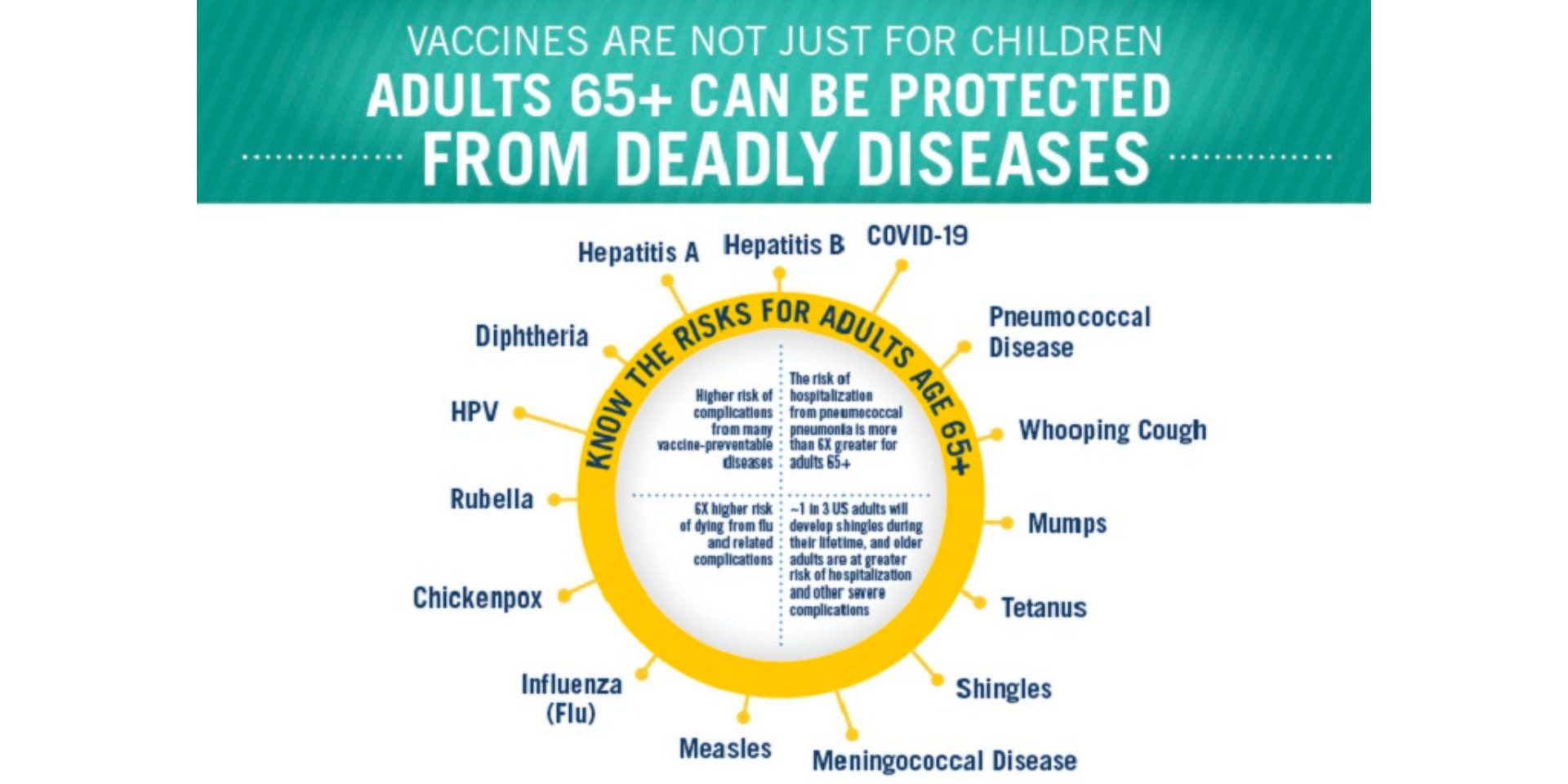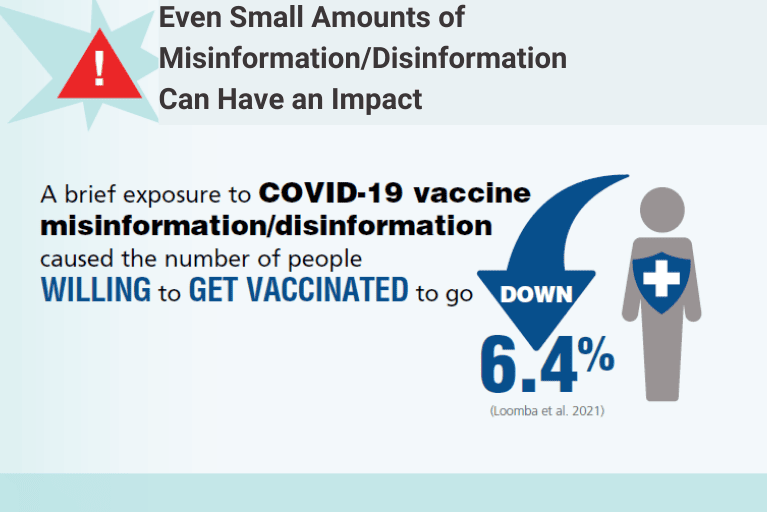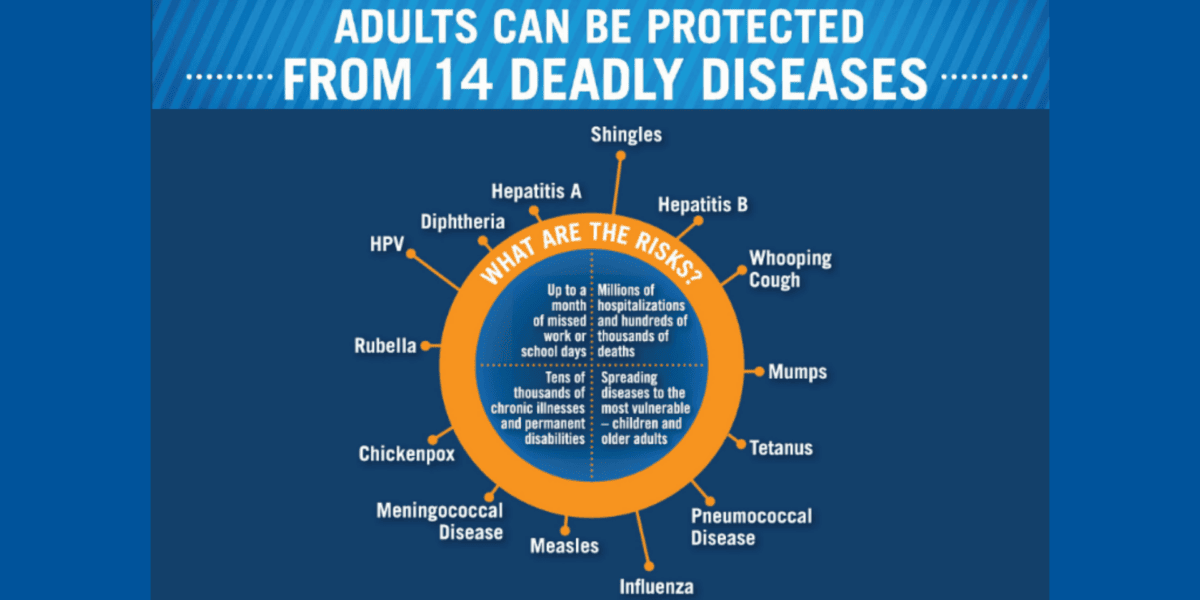
 In recognition of Healthy Aging Month, the National Foundation for Infectious Diseases (NFID) and the Alliance for Aging Research (AAR)—a proud supporter of the NFID Keep Up The Rates campaign—encourage all older adults to stay up to date on recommended vaccines. Special thanks to Lindsay Clarke, JD, vice president of health education and advocacy, for this guest blog post about the importance of vaccinations for older adults.
In recognition of Healthy Aging Month, the National Foundation for Infectious Diseases (NFID) and the Alliance for Aging Research (AAR)—a proud supporter of the NFID Keep Up The Rates campaign—encourage all older adults to stay up to date on recommended vaccines. Special thanks to Lindsay Clarke, JD, vice president of health education and advocacy, for this guest blog post about the importance of vaccinations for older adults.
Why it is important for older adults to stay up to date on all recommended vaccines, and why is the Keep Up The Rates program a priority for the Alliance for Aging Research?
Older adults need to prioritize vaccinations for many important reasons. As we age, our immune systems don’t respond as well so it is important that we stay up to date with recommended vaccines, including boosters for enhanced protection. There are also some vaccine-preventable diseases that are particularly prevalent and serious in older adults, such as shingles and influenza (flu). Finally, older adults socialize with many people— colleagues, friends, family, and neighbors—and can play an important role as trusted messengers about the importance of staying up to date on recommended vaccines.
The Alliance for Aging Research (AAR) is a proud supporter of Keep Up The Rates because we know that routine vaccinations and wellness visits dropped to an alarming rate during the COVID-19 pandemic. We want to raise awareness about the importance of seeing your healthcare professional and receiving vaccines that may have been missed during the pandemic. Vaccines can help prevent flu, pneumonia, shingles, and many other dangerous diseases. We also know that older adults were disproportionately impacted by COVID-19 so it’s extremely important that all older adults get vaccinated for COVID-19. Vaccines allow us to take care of ourselves and get back to what we all love doing in our lives.
What are some of the challenges or barriers to increasing vaccination rates among older adults that you don’t typically see in infants and children?
A major challenge for immunizing older adults is that people often mistakenly think that vaccines are only for children. However, older adults face a higher risk of complications from many vaccine-preventable diseases, and there are now 15 diseases that adults age 65 and older should get vaccinated against. While infants and children have vaccine requirements for school or other activities, we don’t typically see the same requirements for older adults so there is less of an incentive to for them to get vaccinated. Finally, some older adults face mobility issues that may prevent them from leaving their homes, which can require extra effort to schedule in-home vaccinations or arrange special transportation.
Vaccine hesitancy is a significant issue that impacts people of all ages and is especially concerning for older adults, who are at an increased risk of developing severe complications from vaccine-preventable diseases. Could you share any tips for older adults to talk to their loved ones about the importance of vaccines?

According to a recent AAR survey of 1,000 older adults in the US, only 43 percent are very confident or somewhat confident about the credibility of vaccine information they see online. Additionally, it is proven that even brief exposure to COVID-19 vaccine misinformation negatively impacted willingness to get vaccinated. To address that challenge, AAR published The Truth About Vaccines for You and Your Loved Ones, a fact sheet that arms older adults with information to bust myths about vaccines and talk to their loved ones about vaccination. We urge older adults to use the fact sheet to reach out to their children and grandchildren to ensure that they receive COVID-19 vaccines and are up to date on other recommended vaccines.
AAR also released an educational video, Our Best Shot: Preventing and Treating the Flu, that highlights the importance of an annual flu vaccine for older adults. The video encourages older adults to talk to their healthcare professionals about the flu vaccine that is right for them. Older adults are often in a position to influence their family members and friends, so we encourage them to debunk rumors, myths, and conspiracy theories with confidence and conviction.
The Centers for Disease Control and Prevention (CDC) guidance states that COVID-19 vaccines can be safely co-administered with other vaccines. What should older adults know about this guidance now that flu season is approaching?
Research has shown that it is safe to receive multiple vaccines at the same time—that includes COVID-19 vaccines and flu vaccines. If your healthcare professional recommends that you receive a flu vaccine (or another vaccine such as shingles) at the same time as a COVID-19 vaccine, then you should go for it!
Some older adults may be hesitant to visit a healthcare professional to get their recommended vaccines during the ongoing COVID-19 pandemic. What steps should healthcare professionals and older adult patients take to help ensure safety and comfort during vaccination visits?
Healthcare professionals are taking every step to make sure that patients are safe and comfortable in their offices or pharmacies for routine vaccinations. Some are encouraging patients to wait in their vehicles rather than the waiting room, and enhanced cleaning protocols are in place. Follow the CDC guidelines by wearing a mask, social distancing, and washing your hands frequently when visiting a healthcare professional and as part of your daily routine.
Additional Information
For more vaccine resources from the Alliance for Aging Research, visit www.agingresearch.org.Learn more about the Keep Up The Rates campaign and view shareable resources at www.nfid.org/KeepUpTheRates.
To join the conversation and get the latest news on infectious diseases, follow NFID on Twitter using the hashtags #KeepUpTheRates and #HealthyAgingMonth, like us on Facebook, follow us on Instagram, visit us on LinkedIn, and subscribe to receive future NFID Updates.
Related Posts

Protecting Those Who Have Served on Veterans Day
As the US recognizes Veterans Day this week, the National Foundation for Infectious Diseases (NFID) and Vietnam Veterans of America (VVA) encourage veterans and their families to receive recommended vaccines that may have been delayed during the COVID-19 pandemic…
